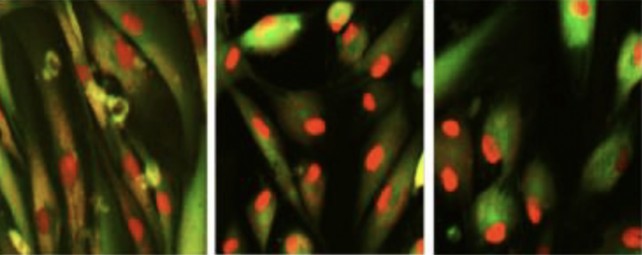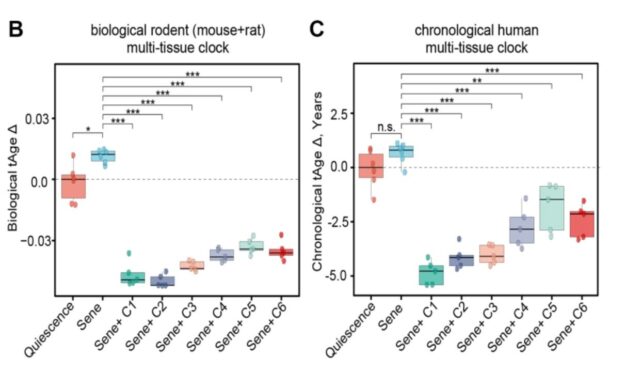A team led by famed Harvard Medical School anti-aging researcher David Sinclair has just published a paper that shows a mix of chemicals are capable of reversing cellular aging… in just four days.
If it sounds too good to be true, it could well be. So far the evidence is only in human cells in the lab – we're a long way from testing this on animal models, and even further from trials in humans.
But the premise, at least, is very intriguing, even if rolling back the clock in single cell lines is a far cry from showing that it is possible to improve age-related health factors in living animals.
"We identify six chemical cocktails, which, in less than a week and without compromising cellular identity, restore a youthful genome-wide transcript profile and reverse transcriptomic age," Sinclair and a team of 17 other researchers write in the journal Aging.
"Thus, rejuvenation by age reversal can be achieved, not only by genetic, but also chemical means."

Taken out of a cell-level context, however, this amounts to a very bold claim, given how early in the process this research is. So it's no surprise there's already some controversy surrounding this paper. Let's break it down.
The study looked at the way cells lose information as they age - specifically epigenetic information.
As they get older, our cells go from having unlimited potential when we're embryos to differentiating into just one specific cell type, and eventually becoming senescent and running out of functionality.
In 2012, Shinya Yamanaka and Sir John B. Gurdon won a Nobel Prize for showing this process can actually be reversed. They found that turning on so-called Yamanaka factors (OCT4, SOX2, and KLF4) in mammals can turn adult cells back into induced pluripotent stem cells with unlimited potential.
A few years later, a team of researchers showed that even temporarily turning on these Yamanaka factors in mice made the rodents healthier.
Since then, the race has been on to apply the same thing in humans, but without turning cells cancerous – which is a risk when you give cells the ability to divide endlessly.
Sinclair's lab has already achieved promising early results and has been able to use Yamanka factors to restore vision in mice and monkeys with damaged optic nerves.
But all of that work involves gene therapy – introducing Yamanka factor genes using a virus – which is expensive, controversial, and not without complications.
The challenge is finding a way to achieve the same results using chemicals that could be turned into a drug or therapy – and this is what Sinclair is saying they've now done.
"Until recently, the best we could do was slow aging. New discoveries suggest we can now reverse it," says Sinclair.
"This process has previously required gene therapy, limiting its widespread use."
To figure this out, the team developed a system that distinguishes young cells from cells that are senescent.
Instead of just looking at genetic factors associated with aging, they also looked for real-time rates of nucleocytoplasmic protein compartmentalization (NCC) – as it turns out, old cells have leaky nuclear membranes.
Using this screening method, the team then showed that they could reverse rates of NCC in senescent human cells so that they resembled young cells again by using six different cocktails of chemicals.
Below is a graph showing the different cocktails (C 1 to 6) tested on old senescent cells compared to a quiescent cell, which acts as a control, compared to data on biological aging from rodents and other human cells. Age is plotted on the vertical axis.

The team is keeping the recipe of these cocktails to themselves for now, although Sinclair has said on Twitter they've since found more than the six in the paper.
The controversy over the study isn't really the study itself, but the claim that they've found some kind of anti-aging elixir when, in reality, no animal models have been tested as yet.
"This new discovery offers the potential to reverse aging with a single pill, with applications ranging from improving eyesight to effectively treating numerous age-related diseases," Sinclair said in a press release.
But while researchers say the new technique developed for screening the cells has promise, it's way too early to be jumping to those conclusions.
Biogerontologist Matt Kaeberlein who leads a lab at the University of Washington Medical Center has spoken out to the Daily Mail and on Twitter about the risks of overstating this research.
Sad sign of the times this even needs to be said, but headlines claiming @Harvard researchers developed a chemical approach to reverse aging are not true. Nobody has a drug to reverse aging. @elonmusk and everyone else, please don’t start taking anything based on this nonsense https://t.co/9GQzwATkcL
— Matt Kaeberlein (@mkaeberlein) July 15, 2023
"This is a preliminary report of a new screening method in one cell line using indirect measures of epigenetic state. There is no evidence here for reprogramming in a tissue, organ, or whole animal," wrote Kaeberlein on Twitter.
Still, with many of us now living longer than ever, researchers are always going to be looking for ways to help us stay healthy for longer, and this may well be an important first step. We just need to take it with a big grain of salt.
The research has been published in Aging.
